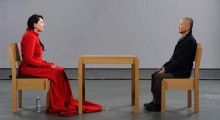Documentary
-
The POV Hackathon: Advancing Web Documentary

A few months ago, I got to participate in StoryCode‘s hackathon for narrative media (you can read about it here), and one of the thoughts I walked away with was that, while creating transmedia properties around fictional narratives is very rewarding, something I really wanted to do was delve deeper into the world of nonfiction transmedia. So I was excited to learn about a documentary transmedia hack sponsored by POV and held this past weekend at their office in DUMBO. If anyone in America understands social documentary, it’s the makers of this PBS series, which has won nearly 100 major awards–Oscars, Emmys, […]
by Randy Astle on Aug 16, 2012 -
DEADLINE FOR 2013 KAREN SCHMEER EDITING FELLOWSHIP ANNOUNCED
The Open Call for the 2013 Karen Schmeer Editing Fellowship has been announced. The fellowship, which comes with a cash prize as well as various mentorship activities, is currently accepting applications and has a deadline of September 28, 2012. From the website: The Karen Schmeer Film Editing Fellowship assists emerging documentary editors by supporting and developing their talent, expanding their creative community, and furthering their career aspirations. In conjunction with American Cinema Editors (ACE) and other partners, the Fellowship, in its third year, offers a wide array of opportunities. The Fellowship is targeted at documentary editors; fiction experience is welcome, […]
by Scott Macaulay on Aug 14, 2012 -
CHEMO INSTEAD OF GRASS
A rough road from the existential world to the sickie ward to the movie screen, dodging hungry demons and embracing cinematic gems, while maintaining a clear eye on the tall grass on the horizon. For several years, my life revolved around attending film festivals and screening movies and writing reviews. Then the bomb dropped. The C-bomb! Now I’m fighting cancer and enduring chemotherapy and struggling as a whacked-out Chemo Head. Unlike Speed Heads and Flop Heads and Crack Heads, whose chem-soaked brains are tightly wrapped around a single heat-seeking obsession and whose emotions are riveted to one Pavlov […]
by Stewart Nusbaumer on Aug 8, 2012 -
Five Questions with Searching For Sugar Man Director Malik Bendjelloul

When Swedish director Malik Bendjelloul first came across the story of ’70s singer/songwriter/cult-hero Rodriguez, it must have seemed too good to be true, especially for a music-focused documentarian. Sixto Rodriguez, the Detroit-based troubadour who blended street-savvy folk, rock, and socially conscious soul on two under-the-radar early-‘70s albums, was completely unknown in America (and almost everywhere else) for decades. But in a twist worthy of an O. Henry story, Rodriguez (who has always worked solely under his surname), somehow ended up an iconic figure in South Africa, where his reputation assumed Bob Dylan-esque dimensions. The catch: most South Africans have long […]
by Jim Allen on Jul 25, 2012 -
Alternate Routes: New DIY Distribution

How three films are navigating the new distribution landscape.
by Randy Astle on Jul 19, 2012 -
SUNDANCE INSTITUTE ANNOUNCES CREATIVE PRODUCING LABS
This week, Sundance Institute announced its 2012 participants in the Creative Producing Initiatives. The week-long program begins with two concurrently-running Creative Producing Labs (July 30-Aug. 3)—the Feature Film Program and the Documentary Film Program and Fund—before capping off with the Creative Producing Summit (Aug. 3-5). Keri Putnam, Executive Director of Sundance Institute, said, “Sundance Institute is committed to supporting emerging independent film producers, and our Creative Producing Initiative is a rare opportunity for them to sharpen their creative instincts, evolve their problem-solving skills, and deepen their knowledge of the distribution landscape. In doing so, they are better equipped to successfully […]
by Billy Brennan on Jul 17, 2012 -
Jonathan Paley, Ballplayer: Pelotero

Although its population is just 2% the size of the US’, the tiny, impoverished Caribbean nation of the Dominican Republic accounts for a fifth of all the young men who go on to become Major League Baseball players. How such an astounding share of pro baseball players come from the DR was what Jonathan Paley and his co-directors Ross Finkel and Trevor Martin set out to explore in Ballplayer: Pelotero. However, what they discovered was that, in addition to being a country ripe with baseball talent — one that the MLB has spent considerable resources mining for the past 50 […]
by Brandon Harris on Jun 28, 2012 -
Five Questions with Big Easy Express Director Emmett Malloy

In Big Easy Express, director Emmett Malloy documents a tour by three cult-favorite indie-folk bands: Edward Sharpe and The Magnetic Zeros, Old Crow Medicine Show, and Mumford & Sons. But the free-wheeling travelogue that develops is equal parts itinerant jam, extended family picnic, and traveling carnival, with Malloy and his crew as the cinematic roustabouts getting it all down for posterity. The film follows the three bands from Oakland to New Orleans, giving us a glimpse not only of their concerts but of their camaraderie as they live and travel on a train together, sharing songs, time, and experiences, and […]
by Jim Allen on Jun 22, 2012 -
Director Matthew Akers on Marina Abramovic: The Artist is Present

The self-described “grandmother of performance art,” Marina Abramovic has for almost 40 years been one of the leading lights of a still-marginalized form. Born to ex-partisan parents in 1946, in the early days of Tito’s Yugoslavia, she is the fascinating subject of Matthew Akers’ new documentary, Marina Abramovic: The Artist is Present. Despite her international renown, the Belgrade-born, New York-based Abramovic failed to enter the public consciousness in the States until her blockbuster 2010 MoMA retrospective. Akers’ film is a sinewy tour through Abramovic’s peculiar life and working process as she embarks upon her most high profile performance yet, one […]
by Brandon Harris on Jun 13, 2012 -
PAJOT AND SWIRSKY’S “INDIE GAME”
The following article about Lisanne Pajot and James Swirsky’s documentary Indie Game was published during the Sundance Film Festival. The film opens today in Los Angeles, New York (at the IFC Center), San Francisco and Phoenix. For a complete list of venues and upcoming screenings, check out the website. Independent film, depending on how you define it, has had many births. But for the purposes of this blog post, let’s consider the one in the 1980s, just before the launch of this magazine. She’s Gotta Have It, Parting Glances, Poison, True Love — these were narrative features made by lone […]
by Scott Macaulay on May 18, 2012






